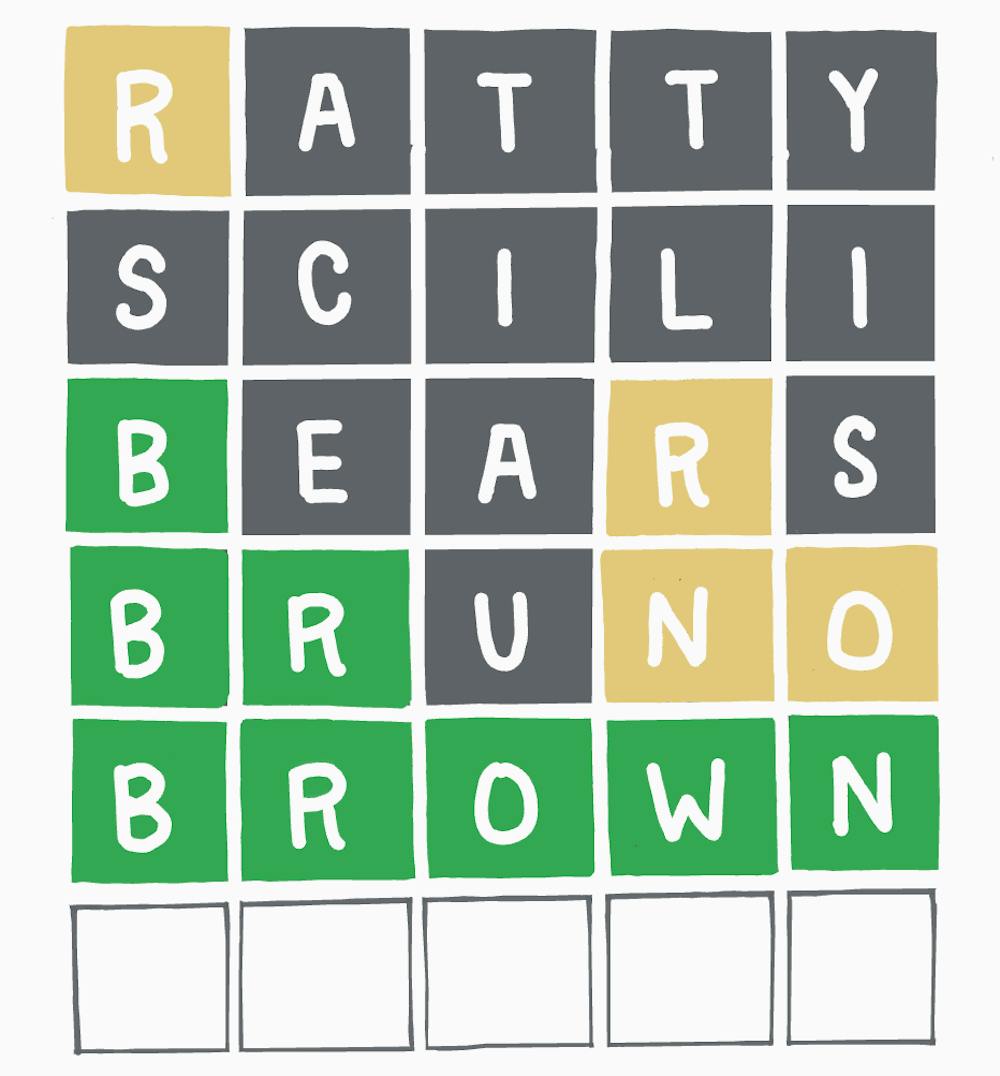Josh Wardle, a software engineer from Brooklyn, New York, created Wordle as a game to play with his partner, who “loves word games.” He formulated an online puzzle that gives players six tries to guess a five-letter word that changes daily.
After each guess, the tile colors of each letter change from gray to yellow to green to indicate how close a user’s guess is to the final word. After receiving glowing reviews from family and friends, Wordle was released to the public in October 2021. What once was a game shared between a Brooklyn couple has now transformed into a worldwide phenomenon with millions of people playing daily.
Community members have become hooked on Wordle, and many place it as a consistent checkbox on their daily to-do lists. Students with a variety of interests have been able to unite under the shared joy of the newest Wordle release when the clock strikes midnight.
For Joe Napolitano ’23, Wordle has become an obsession.
“Wordle was recommended to me by one of my friends,” he said. “As soon as I played my very first game, I was hooked. I told literally everyone that I know that they should start playing immediately after.”
With midterms in full swing, Napolitano identifies Wordle as his favorite stress-reliever. The time he reserves for Wordle is the most relaxing of his day.
“It’s just a great way to decompress and blow 15 minutes,” he said. “It’s something I know I can look forward to each day to relax and think in a non-stressful way.”
Katie Jain ’25, another Wordle fan, noted that the game is not only a means of relaxation. For her, it’s a way to keep up with friends.
Jain discovered the game on TikTok, but she only started playing when a friend challenged her to. “It’s always a fun distraction from my work, and I love getting to share my responses with my friends,” she said. “But only if I get (the word) in three.”
Mina Sarmas ’24 also shares her score with her friends. Just like Jain, she and her friends are competitive, aiming to beat one another with the least amount of tries. In order to maximize her chances of solving the Wordle, Sarmas has developed some game-changing strategies.
“I like to start with words that have a lot of common letters,” she said.
Napolitano and Jain both noted that they have a designated starting word containing multiple vowels and other common letters that might be used in the hidden word.
“I usually start with the word ‘crate’ since someone sent me a YouTube video saying that’s the best strategy,” Jain said. “I’m rarely creative enough to come up with something better, and ‘crate’ has two vowels and common letters.”
Instead of “crate,” Napolitano typically uses “union” or “trace” as his first word.
“From there, I don’t necessarily try to put every letter in its place right away, but I try to create a word or two that uses up letters that haven’t been used yet,” he said. “Then on move three or four, I can just assemble the letters in a logical order.”
Instead of playing the traditional Wordle, Arjun Chopra ‘25 plays Le Mot, a version in French.
“My friends and I have started playing foreign language Wordles,” Chopra said. “French is my favorite.”
Chopra isn’t alone in their exploration of spin-off Wordle games. Jain plays AlWird, the Arabic Wordle, regularly, but she isn’t as competitive with it as she is with the traditional version.
“I’m not really good enough at Arabic to take it seriously, but I still find it to be super fun,” she said. “Honestly, I just find myself plugging in random letters and hoping for the best.”
Wordle variations don’t just stop at foreign languages. There are a number of Wordle-inspired games spanning a wide variety of interests and topics.
Napolitano says that he plays three other Wordle-like games beyond the original.
“I play Byrdle and Lewdle, too,” he said. “And also Absurdle, but that one is only when I’m feeling extra bored.”
Byrdle is choral themed, while Lewdle features explicit solutions. Absurdle gives the user as little information as possible as they play the game.
Sarmas has ventured into Worldle, a geography mock-Wordle that tests players' knowledge of maps and territories but with a twist. Instead of guessing a word, players work to guess which country silhouette is displayed on their screen.
“Playing Worldle was definitely different because guessing a country is obviously a lot different than trying to guess a word,” Sarmas said. “It’s less tedious than the original Wordle for sure, but I don’t really have a preference between the two since they’re just so different in objective.”
Although the traditional game’s tedious make-up doesn’t bother Sarmas, “sometimes the words are just too obscure,” she said. “I know that (Josh Wardle) is British, so I get why some of the words aren’t very common (to U.S. players). But it does annoy me sometimes.”
Jain shares that opinion, but she believes that the puzzle’s words have actually grown to be more obscure since The New York Times bought the game from Wardle in late January.
“I think one of the best parts of the original Wordle was how simple the words were. You’d figure it out and think ‘Oh! Why didn’t I get that sooner?’” she said. “Since The (New York Times) took over, though, the words have been a bit less common which is fine, but kind of removes that ‘aha’ moment.”
Napolitano noted that he has one complaint about Wordle that “shakes him to his core.”
“I hate how we only get one game a day,” he said. “I need more.”

Sofia Barnett is a University News editor overseeing the faculty and higher education beat. She is a junior from Texas studying history and English nonfiction and enjoys freelancing in her free time.





